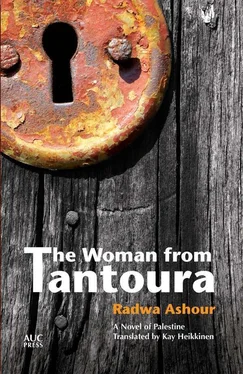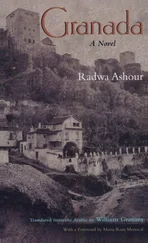We returned to the house. Our mothers already knew about it. We repeated to them some of what we had heard: “At dawn today the Arab armies entered Palestine. Egypt crossed at Rafah and al-Awja. Syria came in from south of Lake Tiberias, the Sea of Galilee. The Lebanese were at Ras al-Naqura. The army of Jordan crossed over the Sheikh Hussein Bridge and the Damia Bridge. The Iraqi army had arrived at the Majami Bridge, and….”
Wisal cut me off: “And the Egyptian planes shelled Tel Aviv. Twice.”
My mother suddenly shouted, “God protect them. God give them victory. God keep them from harm. God bless them and their families, God raise their banner in victory and bring them back safe and sound.”
Then she looked at Wisal’s mother, who was crying, “Pray with me, you are a good woman and are raising orphans, and your prayers will be answered.”
It looked as if the sudden, intense prayer was going to interrupt the news that we wanted to broadcast in its entirety. I cut in: “Listen to all the news first and pray later!”
Wisal laughed, and said, “The Syrian forces are shelling Samakh and two settlements nearby, one of them a big settlement.”
Her mother asked, “Where is this Samakh? And Majami Bridge and the other bridges you mentioned?”
Wisal said that she didn’t know, and I said I would ask my brothers. Wisal went back to finishing the newscast: “The Iraqi forces entered the Rutenberg power station and occupied it, and took prisoner forty Jews who were working on the project.”
My mother asked, “You mean, when they first entered they went right to the power station? By God, good for them! How could they, didn’t the Jews land a blow as they were getting near the station?”
“The station is on the other side of the border. In Jordan. The Iraqi forces occupied the station and then they crossed the border.”
“In Jordan?” She didn’t believe it. She said that we had misunderstood, because if the station was in Jordan the Jordanian army would have closed it and done what was necessary before entering the war. “It doesn’t stand to reason that they would leave the enemy behind them and move forward. I’ll check with Abu Sadiq and figure out what happened from him.”
Suddenly she said, “Turn on the radio, Ruqayya.”
Wisal’s mother added, her face still flushed from crying, “Maybe there will be news of Qisarya.”
I turned on the radio, and we stood listening to what the announcer said. Moments passed. I signaled to Wisal and we left the house, running. I don’t remember whom we met or who said what or when we came home or when we were able to sit with Sadiq and Hasan so they could explain the details we had not understood. But I remember the lanes of the village, that they were noisy. I remember bits and fragments of what people said, people who it seemed had suddenly become generals planning the movements of the forces. One said, “The Egyptians will advance on the coast road and enter Tel Aviv.” Another thought it was likely that they would head for Hebron and from there to Jerusalem to lay siege to it from the south, while the Jordanian forces would besiege it from the east and the Syrians or the Iraqis from the north. They would catch them in a pincer movement. A third said, “I don’t have confidence in King Abdallah, they say he has reached an agreement with the Jews, and even if he didn’t … how can we rest easy with the army when its leader is an Englishman? God protect us.” A fourth asserted that the Syrian forces would head for Haifa and liberate it. A fifth squatted on the ground, grasped a stick from a tree, and drew a map of Palestine on the sand, going on to explain his conception of the movement of the armies: “They’ll cut them off here, separating the south of Palestine from the north.” He moved the stick again, cutting the map lengthwise and saying, “And from here they will isolate the Zionist gangs in the west from the ones in the east.” His companion took the stick and drew a larger map in the sand, designating the cities and towns and movement of the forces. The names multiplied and the directions and movements and who would do what all mixed together. I whispered in Wisal’s ear, “I don’t know the map of Palestine except for the location of Haifa and Jaffa and Gaza and Jerusalem.” I did not tell her that I suddenly regretted my lack of interest in studying geography, which had seemed boring and meaningless to me.
That night I waited up for my father’s return. He came in and I made supper for him. I asked him about Samakh as he was eating. He said, “It’s in the Jordan Valley, south of Lake Tiberias. It’s a few kilometers south of the Syrian border, but because of the train station there Samakh has become the border crossing between the two countries. The traveler stops and they stamp his papers, and customs agents inspect his things.”
He finished his supper and said, “A cup of tea, God bless you, Ruqayya.”
It was not his custom to drink tea at that late hour. I fixed the tea for him and took it to him. He said, “God bless your hands. Sit down, Ruqayya, sit down.”
He took off his head cloth and headband and put them aside. He took off his sandals and sat cross-legged. He moved a little to support his back against the wall. I was glancing at him furtively as he sipped the tea. His mood was different from that of the young men whom I had seen in the afternoon. I recall how he sat, the features of his face, and I ask myself, was he happy? Was he sad, or perturbed and waiting?
How did he move from talking about Samakh to talking about the Haifa — Daraa and the Daraa — Damascus lines, and how did it bring him to talk about his father’s hajj journey on the same line, the Hijazi railway line? I was listening to him, fascinated by what he said. Fascinated by that rare moment when we sat together, something that had never happened before and that would not be given to me again. He was speaking only to me. Everyone was asleep except for us two, and he was confiding in me as if he weren’t my father, who ordered and forbade and to whom my brothers and I didn’t dare lift up our eyes, for fear of meeting his eyes. We would stand like soldiers at attention in his presence, not moving or making a sound. But here I was sitting near him, not glancing at him furtively but looking at him directly, noticing, as he spoke, that his face was handsome, sweet, and good, and that his eyes were an ambiguous color between green and blue, more blue than green, and that in his very black hair there were three white strands.
My father spoke to me, saying, “When we would go to Damascus, your uncle and I, we would take the train from the Haifa East station and arrive in Samakh in a little over two hours. There would be many tourists in the train with us; they would get off at Samakh because they wanted to see the lake where our Lord Jesus walked on the water. There was a walkway connecting the station to the lake, so they would take it to ride in little boats on the lake and look at the city of Tiberias, and then they would take the train back to Haifa. As for us, we would continue on to Damascus.
“At the end of the First World War fierce battles took place between the Turks and the English. Some of them took place in the station buildings, when the fighting was house to house. Samakh is important because it’s the key to the road from Tiberias to Damascus. At the time of the revolt in ’36, ’37, and ’38, your uncle Abu Amin and I would go to Samakh a lot, but we would avoid riding the train because the English had created a team of Jewish wardens to guard the railway from the rebels, a team the English trained along with the Hagana. They would inspect the trains and bridges and surrounding areas for fear of rebel strikes. There were a lot of colonies in the area.
Читать дальше












